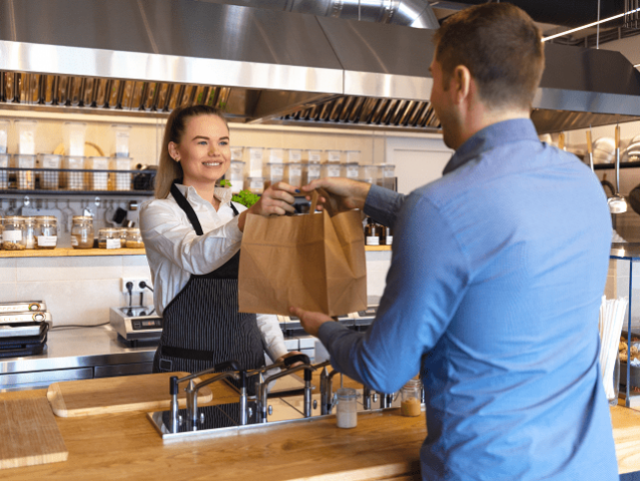In the wake of the coronavirus outbreak, the U.S. restaurant industry has been challenged to adapt and adapt quickly. The rapidly changing decrees from government and public health officials about the number of people allowed to gather in public spaces—or even gather together at all, as lockdown in the United States is now a reality—has forced restaurant operations that provide food and beverage with sit-down service to eliminate this part of their business model.
Now what? What are restaurants going to do? What will the next month or more look like?
Making Food Delivery Safe
For restaurants that deliver and offer takeout, this very well could become their sole revenue stream for a while. But it’s important to note that focusing the business model to one that only offers takeout and delivery comes with a host of new compliance issues, mostly in the way of food safety for the product while it is in transport to the destination. This will cause a major shift in day-to-day procedures. Managers are going to have to rethink how they do business. After all, diners want to support their favorite restaurants, but they are likely wondering is ordering food from restaurants safe now?
Here’s how restaurants will have to adapt to these changing times to ensure food safety.
- Adhere to the highest food-safety standards: Stricter controls will need to be enforced to keep food even more safe than in previous weeks. Employees will need to be monitored even more closely to ensure they are washing their hands, wearing gloves when necessary, and changing those gloves at every change of task.
- Plan for an increase in takeout supplies: This one is simple, but restaurants must act quickly to order and receive this increased volume of to-go orders.
- Ensure the cleanliness and compliance of delivery vehicles: According to the Food Safety Modernization Act (FSMA), the design and maintenance of vehicles and transportation equipment should not cause the food that it transports to become unsafe. For example, the vehicles must be suitable and adequately cleanable for their intended use and capable of maintaining temperatures necessary for the safe transport of food. The measures taken during transportation to ensure food safety, such as adequate temperature controls, preventing contamination of ready to eat food from touching raw food, protection of food from contamination by non-food items in the same load or previous load, and protection of food from cross-contact, i.e., the unintentional incorporation of a food allergen. This may be an “ah ha” moment for the operation. You cannot just throw the pizza box into the back seat of the car and drive to the address and expect the guest to be pleased with the results. Expect a substantial investment in hot- and cold-holding equipment.
- Make the delivery/pick-up process safe: Safety doesn’t stop at food. Employees should be wearing gloves when handling any form of payment, especially when handling cash. They should also wear gloves when handing off packages of food to customers. Gloves should be made readily available so that employees working in the front of the house can change gloves with every guest they serve.
These are uncertain times for everyone to say the least.
But it can also be a time of huge growth and opportunity.
It can also be a time for restaurants to show how they can serve the community in more ways than one. Remember, when the first wave of closures hit, largely affecting schools, the restaurant industry stepped in. Many restaurants began offering local students meals, knowing that many children would go hungry without meals at school. Bravo to an industry that is being hit hard by this world crisis.
Let this be a time to reinvent the business.
Let this be a time for restaurants to build stronger controls into their standard operating practices.
Let this be a time to build compliance into everyday operations.
Want to learn more about earning your BS – Food Industry Compliance Management degree program? Complete the “Request Info” form on this page or call 855-JWU-1881.
